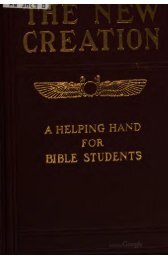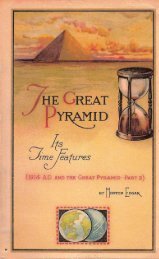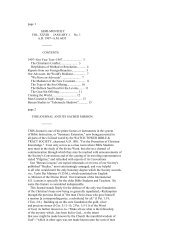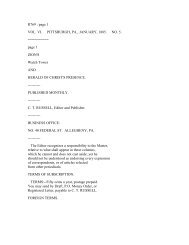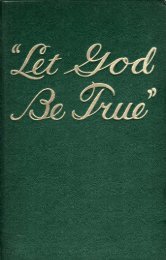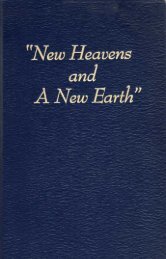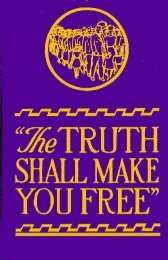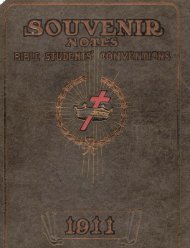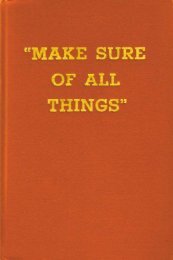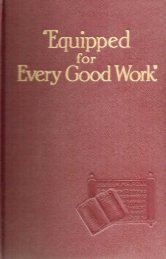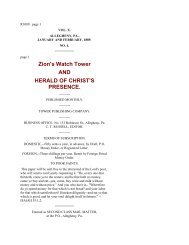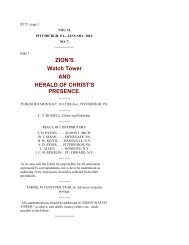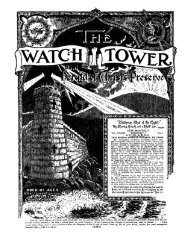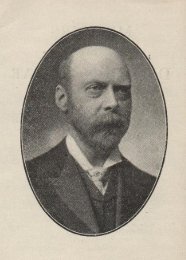1917 Watchtower Bible Student Schism - A2Z.org
1917 Watchtower Bible Student Schism - A2Z.org
1917 Watchtower Bible Student Schism - A2Z.org
You also want an ePaper? Increase the reach of your titles
YUMPU automatically turns print PDFs into web optimized ePapers that Google loves.
FACTS FOR SHAREHOLDERS<br />
world would continue to support the President who is doing<br />
all these things<br />
DO YOU KNOW that the delusion which Bro. Rutherford<br />
has thus far thrust upon the Church-in making it believe<br />
that he is supporting Bro. Russell's policies and carrying<br />
them out, when he is not-may be one of the "strong delusions"<br />
("energy of delusion") referred to by St. Paul in order<br />
that those who do not hold the Truth in absolute righteousness<br />
may "believe a lie"<br />
DO YOU KNOW that the Board of Directors entered into<br />
a solemn promise with Ero. Russell before he donated to<br />
the Society all that it holds dear, arid that that covenant<br />
was that the Board would conduct the Society's affairs<br />
according to his wishes during his life and also according to<br />
his expressed wishes after his death and<br />
DO YOU KNOW that when the majority of the Board<br />
preferred to be true to their covenant made with Bro. Russell,<br />
Bro. Rutherford showed his disregard for his share in the<br />
covenant to which he succeeded hy violating Bro. Russell's<br />
\Vill, ]is Charter and thrusting his Board of Directors out<br />
LEGAL OPINION BY MEMBER OF PHILADELPHIA BAR<br />
LAW OFFICES<br />
J. FITHIAN TATEM<br />
STEPHEN GIRARD BUILDING, PHILADELPHIA, P-I.<br />
In view of the fact that Brother Rutherford based his<br />
action upon the opinion of a Philadelphia lawyer, it was<br />
thought advisable to have a competent inemher of the Philadelphia<br />
bar examine into these questions from the standpoint<br />
of the Pennsylvania Courts, so that we might view affairs as<br />
the lawyers of the home State of the Society would look<br />
upon them. and also to finally determine whether a capable<br />
Philadelphia lawyer would corroborate the opinion obtained<br />
by the President, or would corroborate the opinion rendered<br />
by MessEs. Davies, Auerbach & Cornell, of New York, who<br />
were the advisors of the Directors. That New Yorlc law<br />
firm stands at the head of the legal profession in New York,<br />
as any well-informed lawyer will agree if asked, and Mr.<br />
Tatem, whose opinion just rendered us follows, is experienced<br />
and careful and a well-versed man in corporate law.<br />
The opinion follows :<br />
It is my understanding that this Society is a corporation<br />
of the first-class, <strong>org</strong>a~~ized under paragraph two of the 2d<br />
Section of our Corporation Act, which provides for the <strong>org</strong>anization<br />
of corporations for "the support of any benevolent,<br />
charitable, educational or missionary undertaking." In answer<br />
to your inquiry I beg to reply as follows:<br />
1. ,4 corporation legally <strong>org</strong>anized according to the laws<br />
of the State in which it is incorporated becomes for all purposes<br />
a body politic, and in the absence of express prohibition<br />
in the laws of the State under which it is incorporated and<br />
of those jurisdictions where it proposes to do business, can<br />
do business anywhere. The laws of Pennsylvania contain no<br />
such prohibition; such a corporation should, on general princip!es,<br />
have a right to do business in the State of New York,<br />
unless to do so would be in violation of the statute of that<br />
State.<br />
2. It is a general principle that "a meeting of the Directors<br />
of a corporation may be held outside of the State<br />
creating the corporation, unless the Charter or a statute expressly<br />
forbids such a meeting. The acts, proceedings and<br />
contracts of a meeting of the Board of Directors held out-<br />
side of the State are valid and enforceable." (Cook on Corp.,<br />
7th Ed, 713 a,)<br />
3. Instead of forbidding rneetings of Directors outside the<br />
State of Pennsylvania, the provisions of the Act of Nov. 27,<br />
1865 (Purdon's Digest, Vol. 1, title "Corporations," Sec. 74),<br />
expressly authorize the holding of meetings of Directors either<br />
within or without the State, as a majority may from time to<br />
time appoint. This provision is, however, applicable only to<br />
those corporations where a majority of the Directors thereof<br />
are citizens of any other State. The oizly li~nitation is that<br />
the anvsual election for officers mrrst be held in the State of<br />
Penizsy lvania.<br />
4. In my opinion the proviso of the Pennsylvania corporation<br />
act, which stipulates that three of the incorporators must<br />
'be citizens of Pennsylvania, does not require that there shall<br />
at all times be three members of the Board of Directors citi-<br />
zens of this Commonwealth. The requirement applies only<br />
to the <strong>org</strong>anization of the corporation. The cases which are<br />
sometimes referred to as sustaining the contrary opinion do<br />
not, in fact, deal with this question at all. I refer particularly<br />
to those cited in 1 Purdon 775, note i.<br />
5. It is further to be nijied that the Charter of this Society,<br />
which was incorpsrated as a'zove: under paragraph two<br />
of the 2d section of the P'snzsy:~-ania Corporation Act, which<br />
provides ior the orpar.irzrior.<br />
. -<br />
of co:-,orations oi the first<br />
class, as approved and ssr~:xed by :ke Court, contains no<br />
jvovisiotl nrlzich rc,oztld ri,-!



